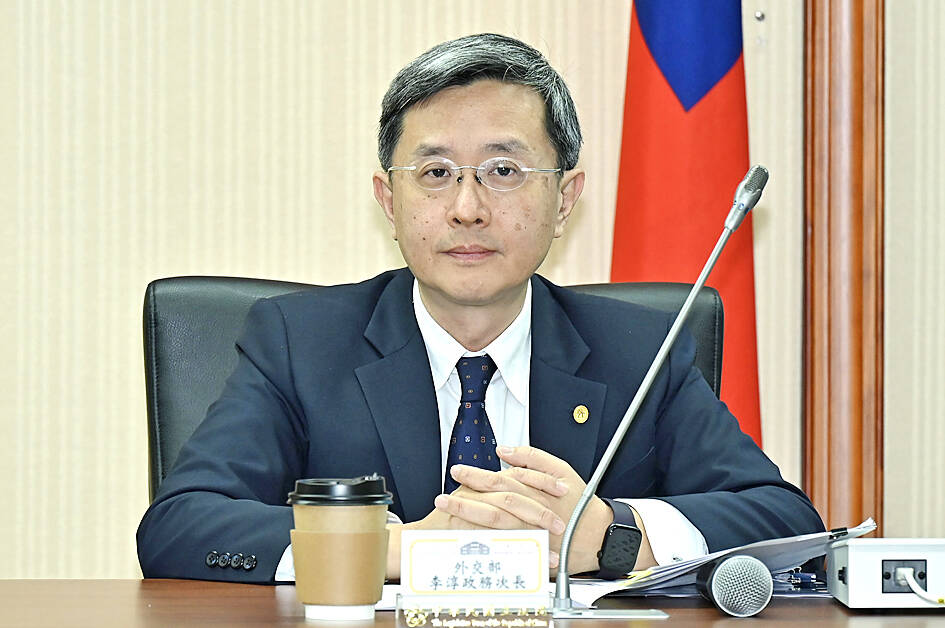US experts called on Washington to sign a free-trade agreement with Taiwan, as the relationship between the two countries is strategically significant, Deputy Minister of Foreign Affairs Roy Lee (李淳) said yesterday.
Lee made the remark during an interview with media personality Clara Chou (周玉蔻) a week after the two nations signed an initial agreement under the US-Taiwan Initiative on 21st-Century Trade.
Signing the agreement was a “big breakthrough” in economic and trade relations of the past two decades, and an important milestone for Taiwan’s overall economic and trade ties, he said.

Photo: Tu Chien-jung, Taipei Times
The agreement would benefit both sides, he added.
Taiwan’s international position and pressure from China make it challenging for the nation to sign trade deals with countries that are not diplomatic allies, he said.
The deal with the US has the structure of a typical free-trade agreement, and can be expanded in scope and content, Lee said.
The agreement would hopefully be an example for other countries or trade blocs to follow in signing similar deals with Taiwan, he said.
The US is Taiwan’s second-largest export market, and economic and trade ties have grown closer in the past few years, he said.
Asked whether the US might replace China as Taiwan’s top export market, Lee said that “it definitely would.”
Taiwan and the US are able to work smoothly together because their interests align, he said.
Taiwanese businesses are following a global trend of reconsidering dependence on China and “derisking” by moving key operations out of the nation, Lee said.
The next step in ties with Washington would be to negotiate an agreement to eliminate double taxation, which would draw more firms to invest in the US, he added.
A free-trade agreement with Taiwan would be a strategic tool demonstrating the US’ support of the nation, a view backed by experts in the US, he said.
The benefits of the initial agreement might not be obvious in the short term and would be difficult to quantify, he added.
However, three committees are to be established to discuss trade facilitation, small and medium-sized enterprises, and good regulatory practices, Lee said.
The discussions would be broader and more innovative than under the Trade and Investment Framework Agreement, which focused on resolving trade obstacles, he said.

Taiwan is stepping up plans to create self-sufficient supply chains for combat drones and increase foreign orders from the US to counter China’s numerical superiority, a defense official said on Saturday. Commenting on condition of anonymity, the official said the nation’s armed forces are in agreement with US Admiral Samuel Paparo’s assessment that Taiwan’s military must be prepared to turn the nation’s waters into a “hellscape” for the Chinese People’s Liberation Army (PLA). Paparo, the commander of the US Indo-Pacific Command, reiterated the concept during a Congressional hearing in Washington on Wednesday. He first coined the term in a security conference last

Prosecutors today declined to say who was questioned regarding alleged forgery on petitions to recall Democratic Progressive Party (DPP) legislators, after Chinese-language media earlier reported that members of the Chinese Nationalist Party (KMT) Youth League were brought in for questioning. The Ministry of Justice Investigation Bureau confirmed that two people had been questioned, but did not disclose any further information about the ongoing investigation. KMT Youth League members Lee Hsiao-liang (李孝亮) and Liu Szu-yin (劉思吟) — who are leading the effort to recall DPP caucus chief executive Rosalia Wu (吳思瑤) and Legislator Wu Pei-yi (吳沛憶) — both posted on Facebook saying: “I

The Ministry of Economic Affairs has fined Taobao NT$1.2 million (US$36,912) for advertisements that exceed its approved business scope, requiring the Chinese e-commerce platform to make corrections in the first half of this year or its license may be revoked. Lawmakers have called for stricter enforcement of Chinese e-commerce platforms and measures to prevent China from laundering its goods through Taiwan in response to US President Donald Trump’s heavy tariffs on China. The Legislative Yuan’s Finance Committee met today to discuss policies to prevent China from dumping goods in Taiwan, inviting government agencies to report. Democratic Progressive Party Legislator Kuo Kuo-wen (郭國文) said

The Ministry of Economic Affairs has fined Taobao NT$1.2 million (US$36,900) for advertisements that exceeded its approved business scope and ordered the Chinese e-commerce platform to make corrections in the first half of this year or its license would be revoked. Lawmakers have called for stricter supervision of Chinese e-commerce platforms and more stringent measures to prevent China from laundering its goods through Taiwan as US President Donald Trump’s administration cracks down on origin laundering. The legislature’s Finance Committee yesterday met to discuss policies to prevent China from dumping goods in Taiwan, inviting government agencies to report on the matter. Democratic Progressive Party